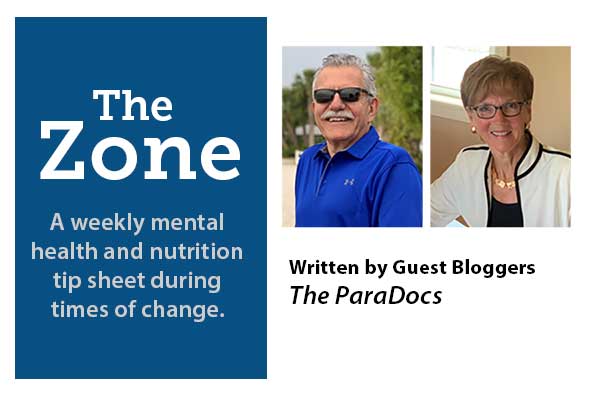In order to benefit from change, one must prepare. What are the risks and what are the benefits?
In Volume 30 of this guest series, psychotherapist, Dr. Francis L. Battisti, and nutritionist, Dr. Helen Battisti, encourage us to prepare for upcoming change with a Risk-Benefits analysis.
For over 10 years, they have worked closely with us on aging concerns and have presented many webinars and in-person workshops. Their newsletter, The Zone, is a weekly mental health and nutrition tip sheet during times of change.
For the past three volumes of The ZONE we have been addressing the Stages of Change model. We believe that this applied overview of the model can be useful in navigating the chaos that we may be experiencing during the upcoming fall and winter months.
In this volume we will be reviewing the change process of moving from the Contemplative Stage to the Preparation/Planning Stage. Basically, moving from ambivalence to preparing for change. It is important to keep in mind that ambivalence is a key component of the Contemplative Stage and that this can prevent us from moving forward with making certain decisions in our daily lives.
A useful tool to assist with this transition is applying a risk-reward analysis to assess the situation at a deeper level. This tool offers the opportunity to explore the risks and benefits of the present behavior and the risks and benefits of the potential change. The analysis provides us with a clearer picture into our ambivalence. At times, after completing the risk-reward analysis, we may decide that the benefits of the present behavior outweigh the benefits of the potential change. However, if we decide to implement a change plan, it needs to be acceptable, accessible, and effective. Although we may be developing a change plan it is not uncommon to still feel some sense of ambivalence. Also, upon reaching this point in our change process, we may begin to experience a greater sense of hope.
Key Takeaways
- The Stages of Change model provides a useful template for change.
- During the Contemplative Stage we experience ambivalence.
- The Risk-Benefit analysis provides a useful tool to sort things out.
Best Practices
- It is risky to not do a Risk-Benefit analysis.
- It is risky to do a Risk-Benefit analysis.
- Be risky!
Things to Limit
- Sticking your head in the sand.
- Processed foods.
- Being comfortable with ambivalence.
In summary, while working through the process of ambivalence can be taxing, the effort can be well spent. It may feel like we do not have the energy to work through the process. However, the outcome of the process can provide a source of renewed energy.
Quote of the Week
“In these times I don’t, in a manner of speaking, know what I want; perhaps I don’t want what I know and want what I don’t know.”
–Marsilio Ficino

